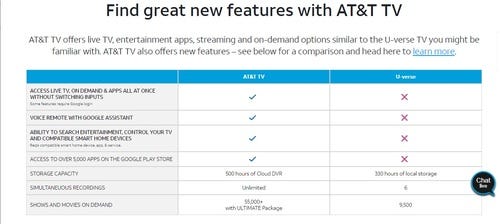AT&T halts sale of U-verse TV
Company is instead pushing the sale of AT&T TV, a new contract-based, big-bundle streaming service that runs on an operator-supplied Android TV box.

AT&T has stopped selling U-verse TV, its legacy IPTV service, as the company urges consumers to subscribe to AT&T TV, a big-bundle, streaming pay-TV service that runs on an AT&T-supplied Android TV box.
AT&T's posted word of its decision, first spotted by TV Answer Man publisher and long-time TV industry watcher Phillip Swann, on its website: "To help our employees serve our existing customers, we're no longer selling U-verse TV. Service for existing U-verse TV customers is not impacted."
AT&T Stops Selling U-verse TV https://t.co/WaWzj8vqDu #ATT
— The TV Answer Man (@SwanniOnTV) April 3, 2020
AT&T stopped taking online sales of U-verse TV earlier this year.
Light Reading asked AT&T to elaborate on the decision, as it is not clear if it is halting the sale of U-verse TV to help avoid in-home customer installs during the COVID-19 crisis or if the decision simply stems from the company's desire to accelerate the reach and adoption of AT&T TV, a service that went nationwide in early March and uses a self-installation model.
However, AT&T web page does go out of its way to offer a comparison showing the advantages of AT&T TV over U-verse TV and talking up AT&T TV's use of integrated apps, voice remote capabilities, a cloud DVR with unlimited simultaneous recordings and a larger VoD library.
Figure 1:  Even AT&T's own website does not look upon U-verse TV favorably.
Even AT&T's own website does not look upon U-verse TV favorably.
Why this matters
It's the start of the big good-bye for U-verse TV. The decision also comes down comes about 15 years after U-verse was introduced as the brand of SBC's suite of IP-based services (SBC merged with AT&T in late 2005 and adopted the AT&T name). U-verse TV first launched in San Antonio, Texas, in June 2006.
The decision to stop selling U-verse is also a step toward whittling down a service that runs on Mediaroom, a middleware platform acquired by Ericsson from Microsoft in the fall of 2013 that's now part of MediaKind. CenturyLink stopped selling Prism TV, its IPTV offering powered by Mediaroom, back in the spring of 2018.
AT&T, meanwhile, has been de-emphasizing all of its legacy pay-TV products amid the birth of the AT&T TV streaming service.
Speaking at an investor conference last month, AT&T President and COO John Stankey said the DirecTV satellite TV service would only be sold where "it has a rightful place in the market," meaning it will live on as a standalone service largely in rural and less dense suburban areas and places where cable broadband is not as prevalent.
AT&T lost about 1.16 million video subs in the fourth quarter of 2019, including 945,000 "premium" subs from DirecTV satellite and U-verse TV.
Related posts:
— Jeff Baumgartner, Senior Editor, Light Reading
About the Author(s)
You May Also Like


.jpg?width=300&auto=webp&quality=80&disable=upscale)


_International_Software_Products.jpeg?width=300&auto=webp&quality=80&disable=upscale)






